But with so much information on the best ways of transcribing lectures, you are bound to find yourself a little confused. This guide will show you the best ways of transcribing lectures and offer tips on how you can make the process a lot more effective.
Why Transcribe Lectures?
Transcribing lectures offers a range of different benefits that have shone the spotlight on the advantages of the use of technology in the classroom, including the benefits of lecture transcription . These are described below.
Improved Accessibility: Transcribing lectures makes access to learning material a lot easier for students across the board, especially for those with language barriers, cognitive disabilities, or other special needs. It can also help students take better meeting notes at the most convenient time.
Increased Engagement: Transcripts can also help increase engagement in the classroom, particularly when they are combined with other multimedia elements such as audio, video, and games. This helps improve learning outcomes in the long run by using a screen recorder .
Reusability: Educators can also benefit from providing transcripts of lectures as they can adapt them into other formats for learning materials rather than having to create them from scratch each time.
Efficiency: Automatic transcription also helps save time, as students won’t have to take manual notes and can be more engaged in discussions in the classroom, making use of an online camera recorder .
These benefits come together in a range of different situations, such as when you intend to improve study efficiency to better meet learning outcomes, create materials that all students can access easily, and leverage lecture archives to improve students’ ability to retain information.
How to Transcribe Lectures Efficiently
There are several aspects to transcribing lectures efficiently, and the first one to consider is recording the lecture itself. Educators must ensure that their lectures are recorded using high-quality microphones and that they’re clear enough for a tool like Transkriptor to transcribe accurately. The two sections below show you how you can transcribe lectures efficiently.
Preparing Your Recording
The quality of your recording will greatly impact how accurately any tool can transcribe it. As a result, educators must ensure that they put in the time and effort to deliver high-quality lectures both online and offline. A lapel microphone, for example, can be a great way to get crystal-clear recordings. You should ensure the microphone isn’t covered if you're using a phone.
Automating Transcription with AI Tools
An AI-powered audio-to-text tool like Transkriptor can automate lecture transcriptions so you can minimize distractions and focus on the content of the lecture itself. Here’s how you can use Transkriptor to automate this process:
Step 1: Open the Transkriptor website and click on ‘Try It Free.’
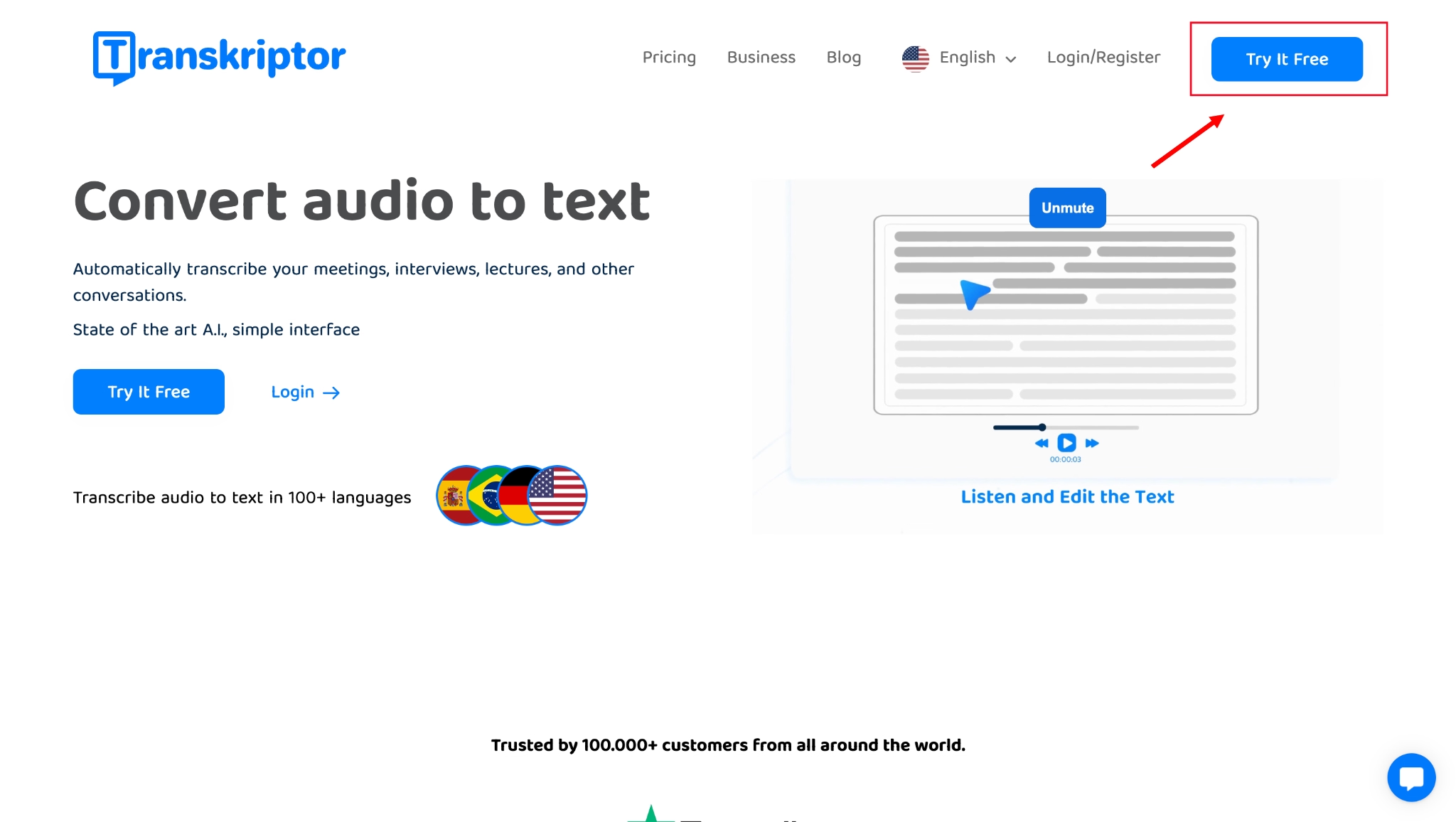
Step 2: At this stage, you’ll be asked to sign up. You can do this using your email address and a password or your Google account to make the process quicker.
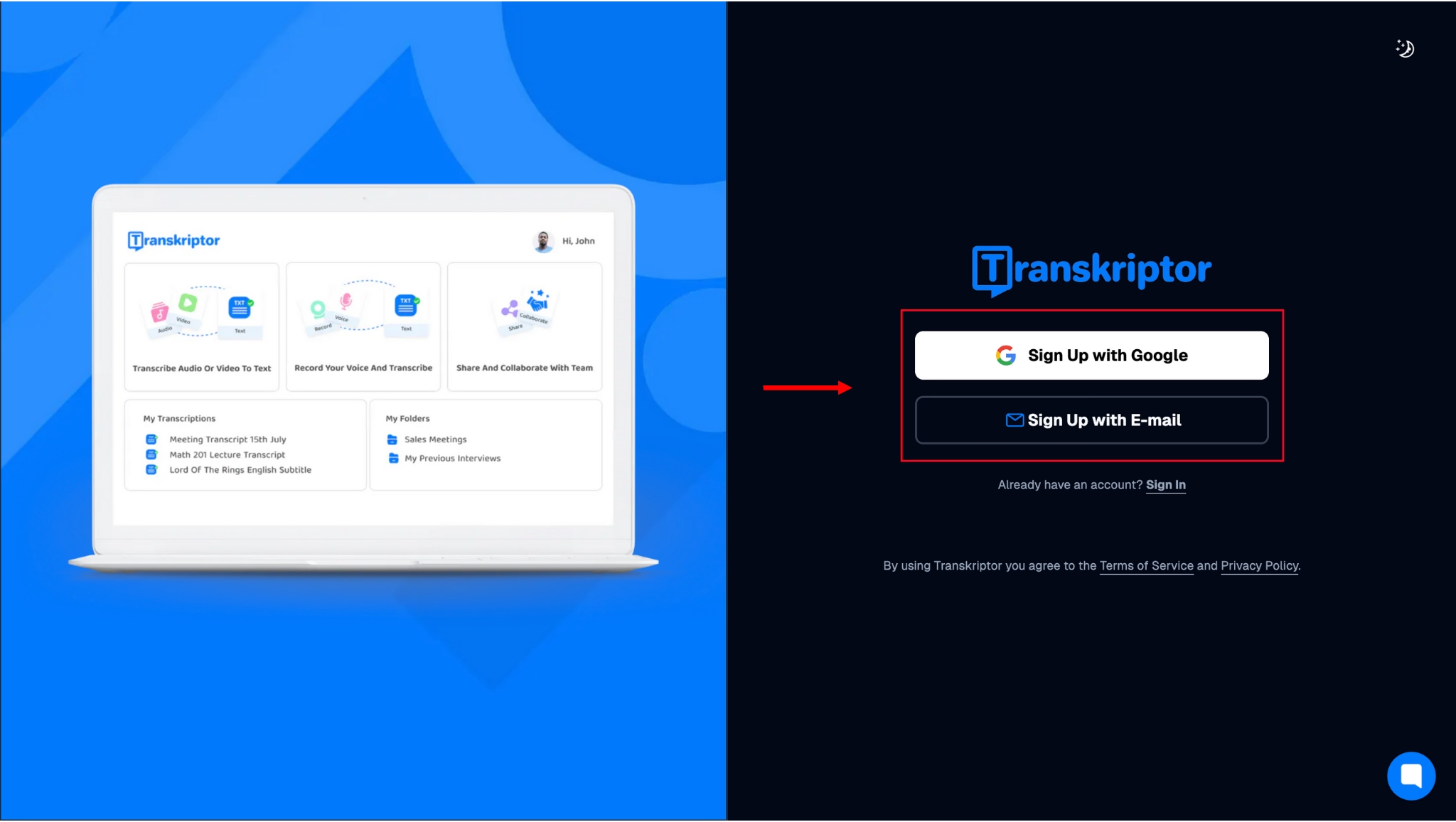
Step 3: Once you’ve signed up with your credentials, you’ll be taken to the tool’s dashboard, where you’ll see options to upload an audio or video file, record a lecture in real-time, or convert an audio file from the cloud or YouTube.
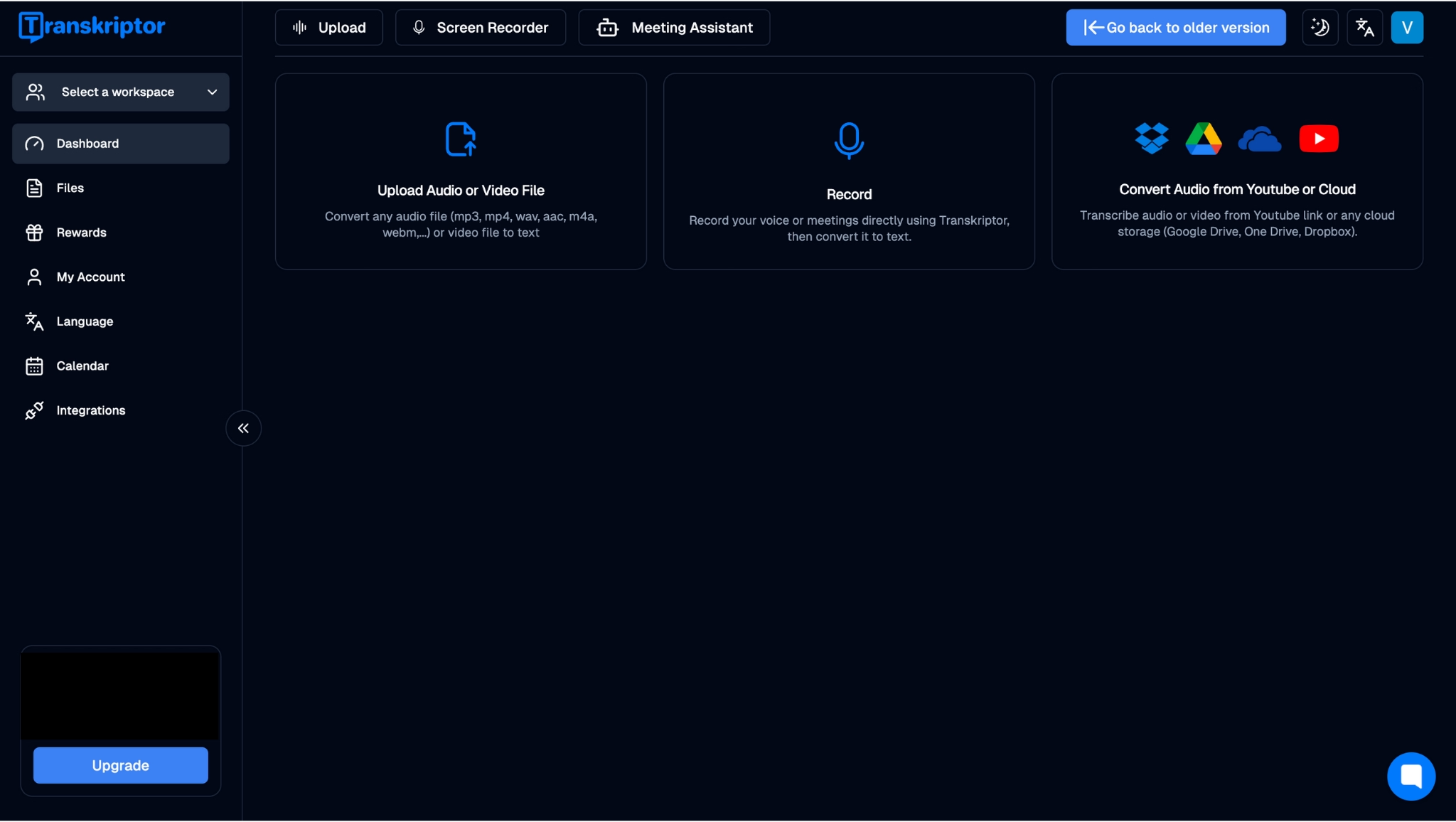
Step 4: If you want to record a lecture in real time, click on the ‘Record’ option and give your device permission to use your camera and microphone.
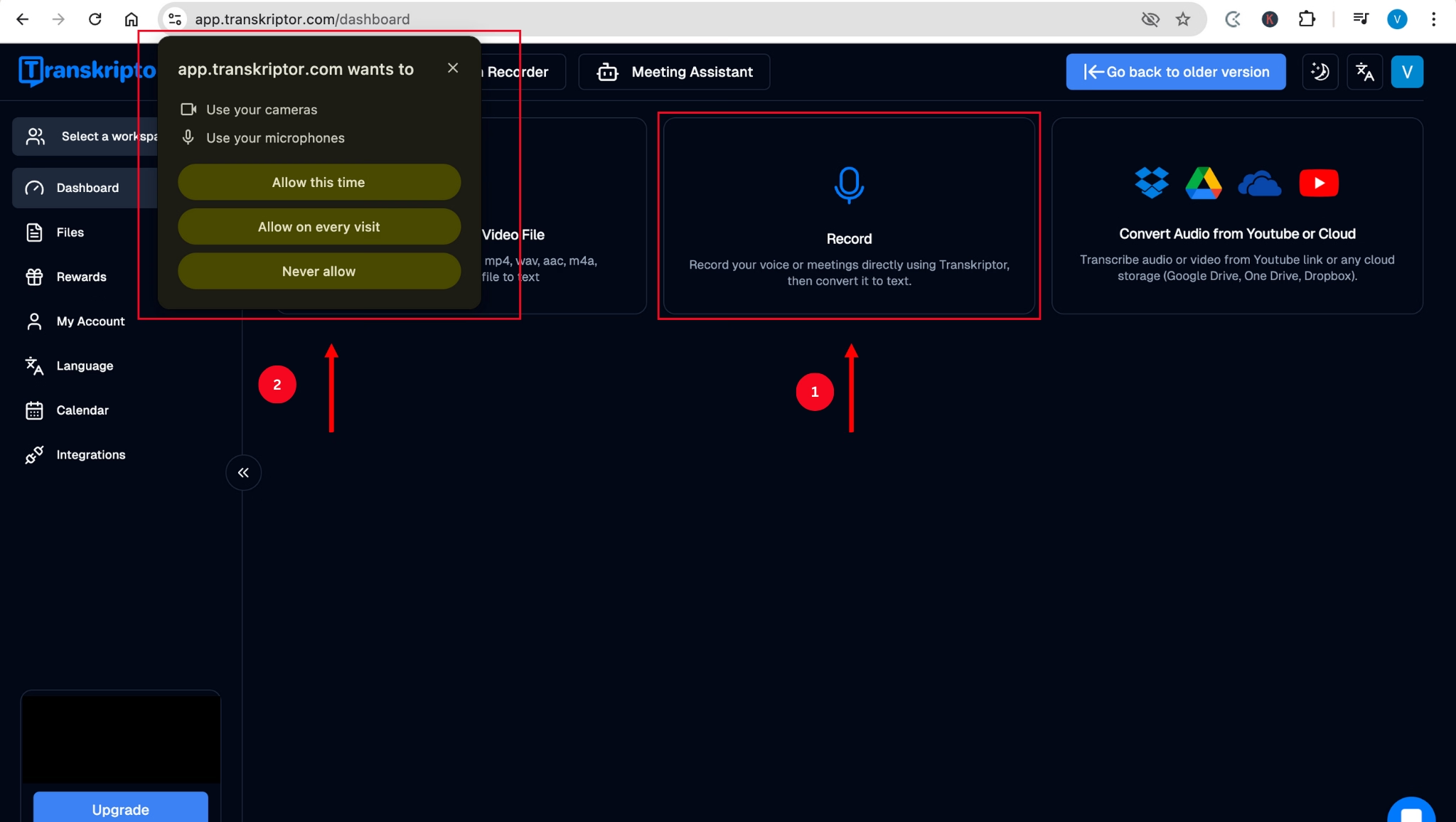
Step 5: On the next page, you should set your recording settings based on your preferences and click on ‘Record.’ Then, choose whether you want to share a tab or your entire screen with Transkriptor and click on ‘Share.’
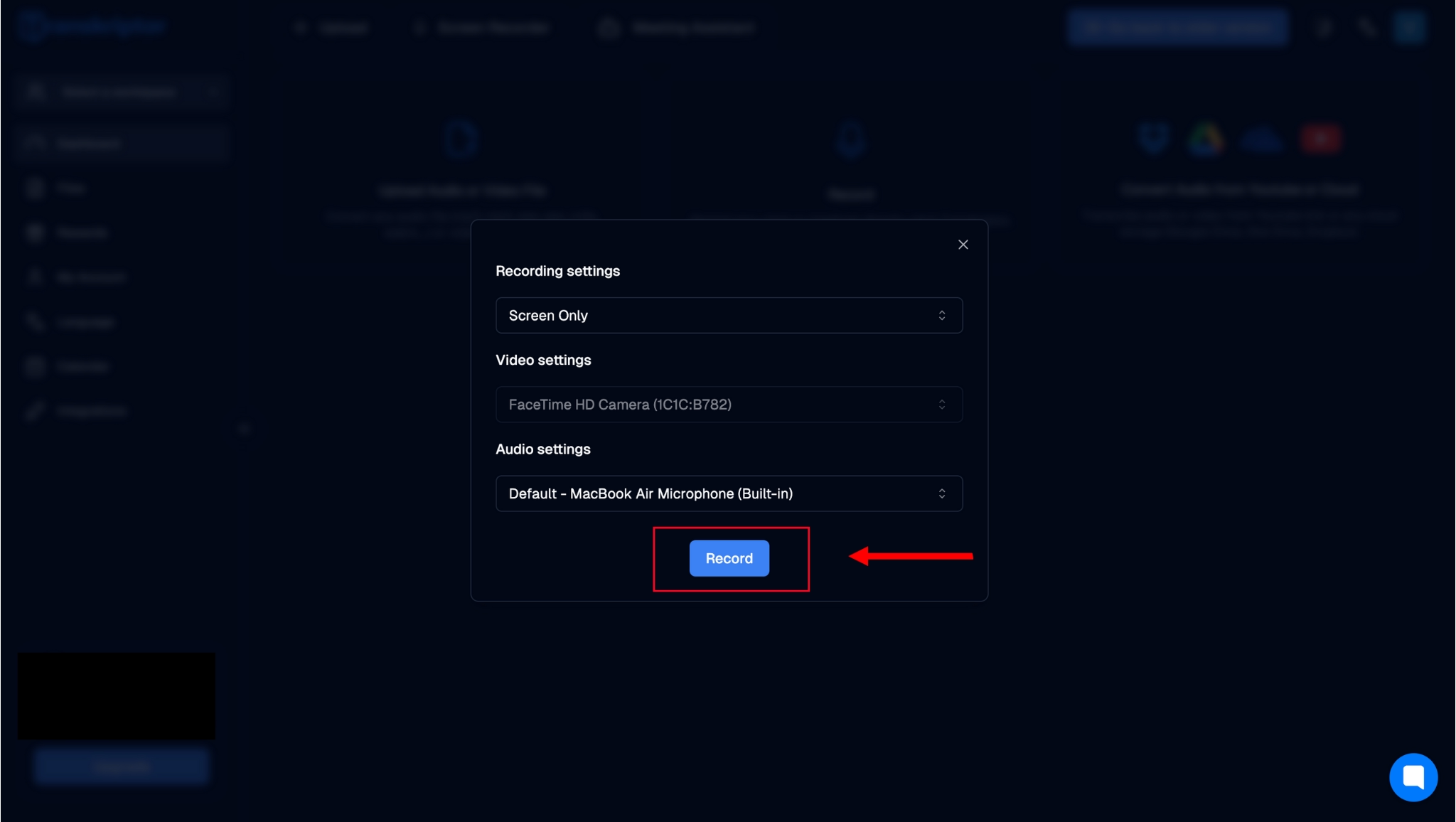
Step 6: Once you’re done recording your lecture, you must click on the stop icon in the screen's bottom left corner. Once clicked, the tool will automatically upload your transcription to the cloud. You can also select the language and then click on ‘Transcribe.’ You’ll see the transcription being processed on the screen.
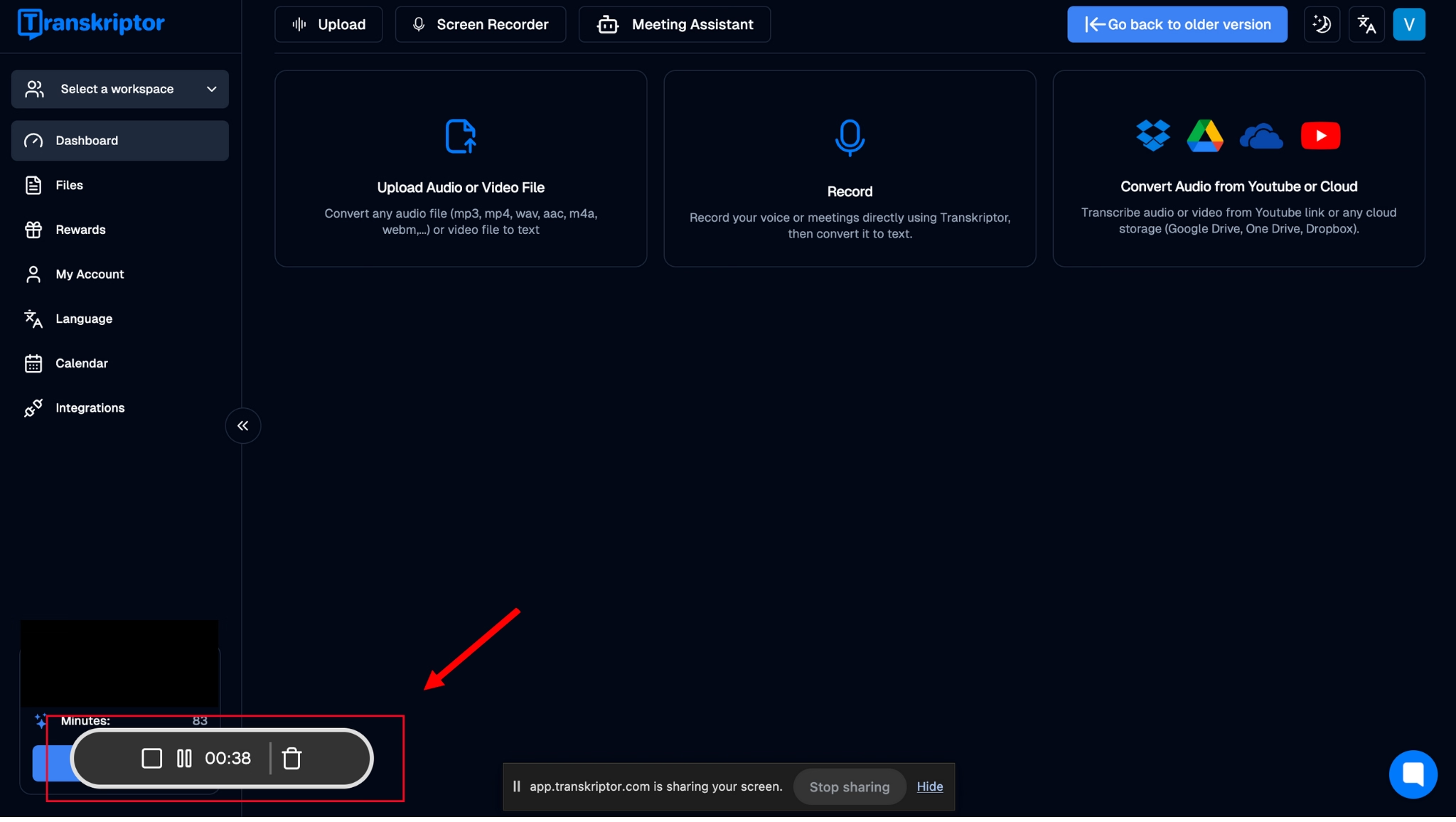
Step 7: Once the recording is processed, the transcript will be ready on the screen. You can share or download it or even ask the AI bot questions based on it.
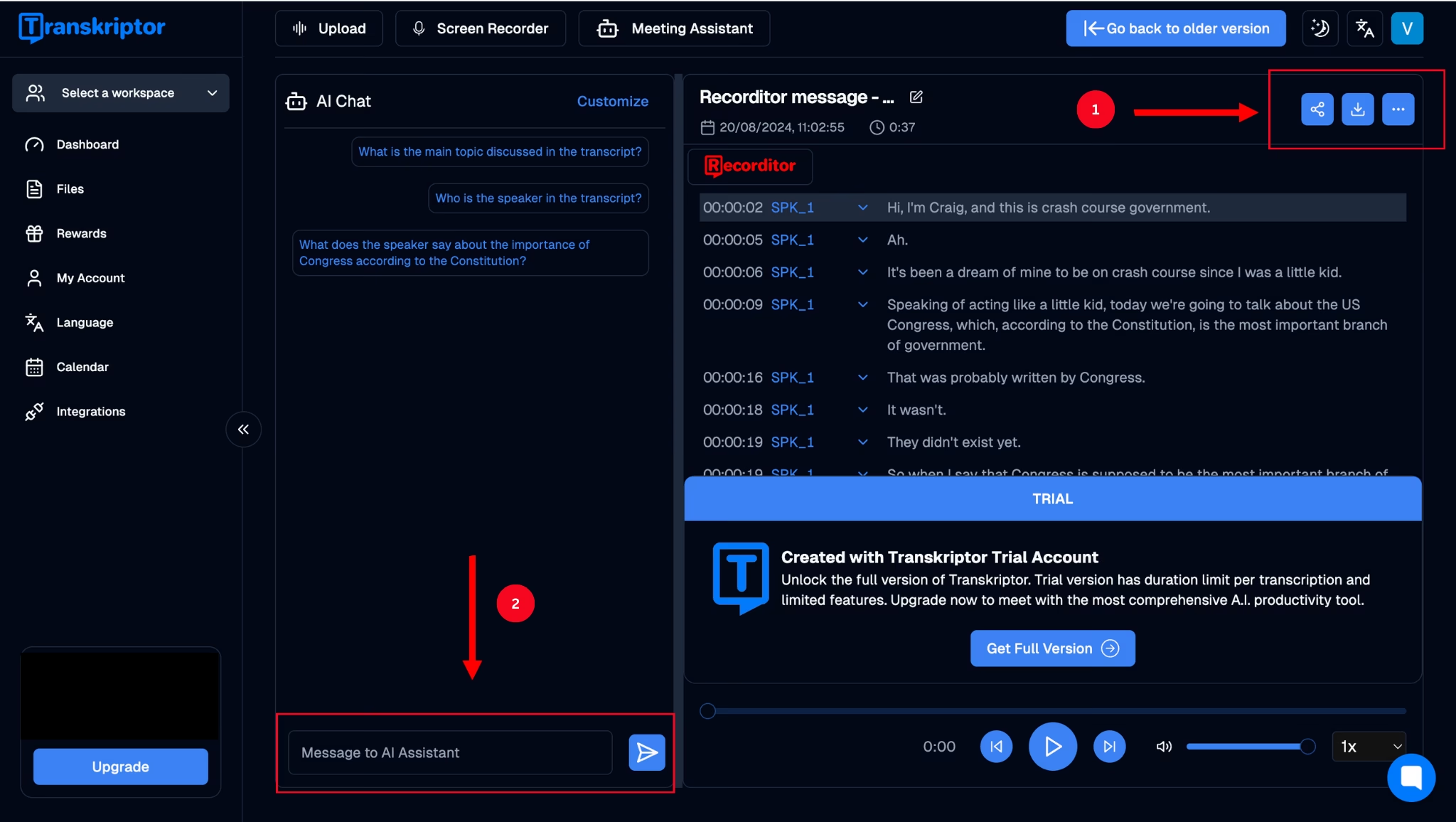
Integrating Speech-to-Text in Education
Speech-to-text technology in education has revolutionized how educators and students disseminate and imbibe educational content. It has increased access to those who may have linguistically different backgrounds and also caters to those who might be engaged in distance learning—one of the key consequences of the COVID-19 pandemic.
Another key benefit of speech-to-text is that it also helps save time for students who might forget their thoughts in the rapid pace of the classroom environment, especially during lecture breaks . It ensures that every student, regardless of their personality, gets the opportunity to participate in meaningful discussions and improve their understanding of the subject being taught.
AI-powered tools like Transkriptor are also revolutionizing education in a host of different ways, including improving accessibility in lectures for all students. They enable students who can voice their opinions but struggle to write their thoughts down cohesively to participate in classroom discussions. They further make the process of teaching much more efficient and equitable by ensuring educators can provide high-quality transcripts. They can also repurpose these for other academic material.
Additionally, they allow teachers to evaluate knowledge and assessments more accurately, helping reinforce the importance of lecture attendance for academic success. For example, some students simplify their writing style to avoid spelling and grammatical errors, whereas others who struggle with handwriting turn in illegible assignments. As a result, digital transcripts can be a great way to assess knowledge retention without such technicalities affecting students’ grades.
Tips for Accurate Lecture Note Transcription
While a tool like Transkriptor is designed to always provide high-quality and accurate transcriptions, certain best practices and tips can ensure consistently accurate results.
Choose the Right Recording Tools
With so many tools available, it can be difficult to know which one to use to record a lecture. You've got voice recorders on your smartphones and several tools online that claim to accurately transcribe your lectures for you, including generating a youtube transcript . A tool like Transkriptor, for example, uses the power of AI to give you the most accurate results possible, with very few corrections needed at the end.
Take Note of the Lecture’s Outline
While an audio-to-text tool will record every word of the lecture, you'll end up with a large body of text that won’t be segmented into subtopics.
Unless you use an AI enhanced transcription tool like Transkriptor that can automatically summarize and edit your transcription into lecture notes, you should manually take note of the different topics discussed.
This can also be a great way to revise key points before an assessment.
Edit & Review Your Transcript
Any audio-to-text lecture transcription tool will be prone to a few errors, especially if the lecture involves complex jargon and is delivered in a strong accent. The best way to ensure the accuracy of the transcript is to review it right after the lecture when it’s fresh in your mind. This way, you can correct any errors that you may not be able to identify when you read through the transcript a few days or weeks later. Transkriptor’s rich text editor also allows you to correct any mistakes and edit speakers in slow motion, making editing easier.
Best Tools for Transcription for Lectures
A quick search for the best lecture transcription tools online will throw up multiple results, and this can make it hard to decide which is truly the best one for your needs. We’ve explored three of the best voice-to-text lecture tools in this section to make the decision easier.
Transkriptor
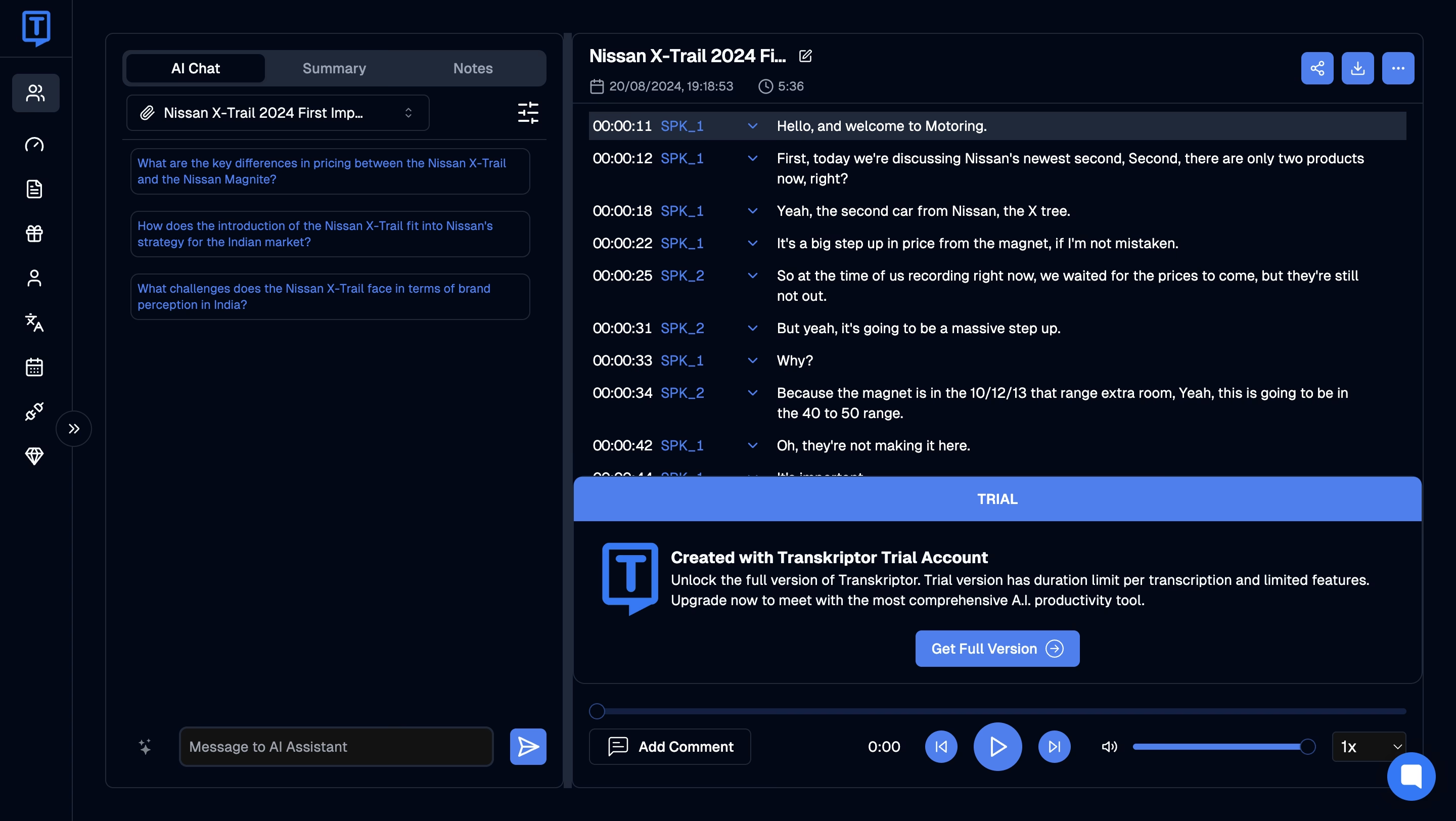
Transkriptor is an ideal tool for enhancing accessibility in educational environments, providing a seamless solution for transcribing and translating lecture content.
With its ability to convert transcriptions into multiple languages, Transkriptor helps eliminate language barriers among students, ensuring everyone has access to high-quality learning materials regardless of their native language.
The user-friendly interface of Transkriptor is designed to make transcribing educational content quick, accurate, and efficient. This is particularly beneficial in lecture settings, where real-time transcription can help students who are non-native speakers, those with hearing impairments, or anyone who needs written records for study purposes.
The tool’s accurate transcriptions also cater to students with busy schedules who often juggle multiple projects simultaneously, allowing them to focus more on learning rather than note-taking. For assignments involving multimedia, use Convert MP4 to Text to streamline the task.
Transkriptor’s versatility is another major advantage in educational settings. It supports the transcription of existing audio and video files from your device or the cloud and can even transcribe videos from platforms like YouTube.
This flexibility is crucial for students and educators who use various sources for learning and teaching. Whether it’s a recorded lecture, a podcast, or an educational video, Transkriptor can handle it all, making it easier for students to access and review content at their own pace.
However, while Transkriptor is highly accurate, there may be times when minor adjustments are needed, especially with highly technical subjects or strong accents. This is common with most transcription tools and is generally a quick fix that ensures the transcript is tailored perfectly to the content.
Overall, Transkriptor is a powerful tool for educational settings, enhancing accessibility, supporting diverse learning needs, and providing reliable transcriptions that help students and educators maximize their learning experience.
Rev.com
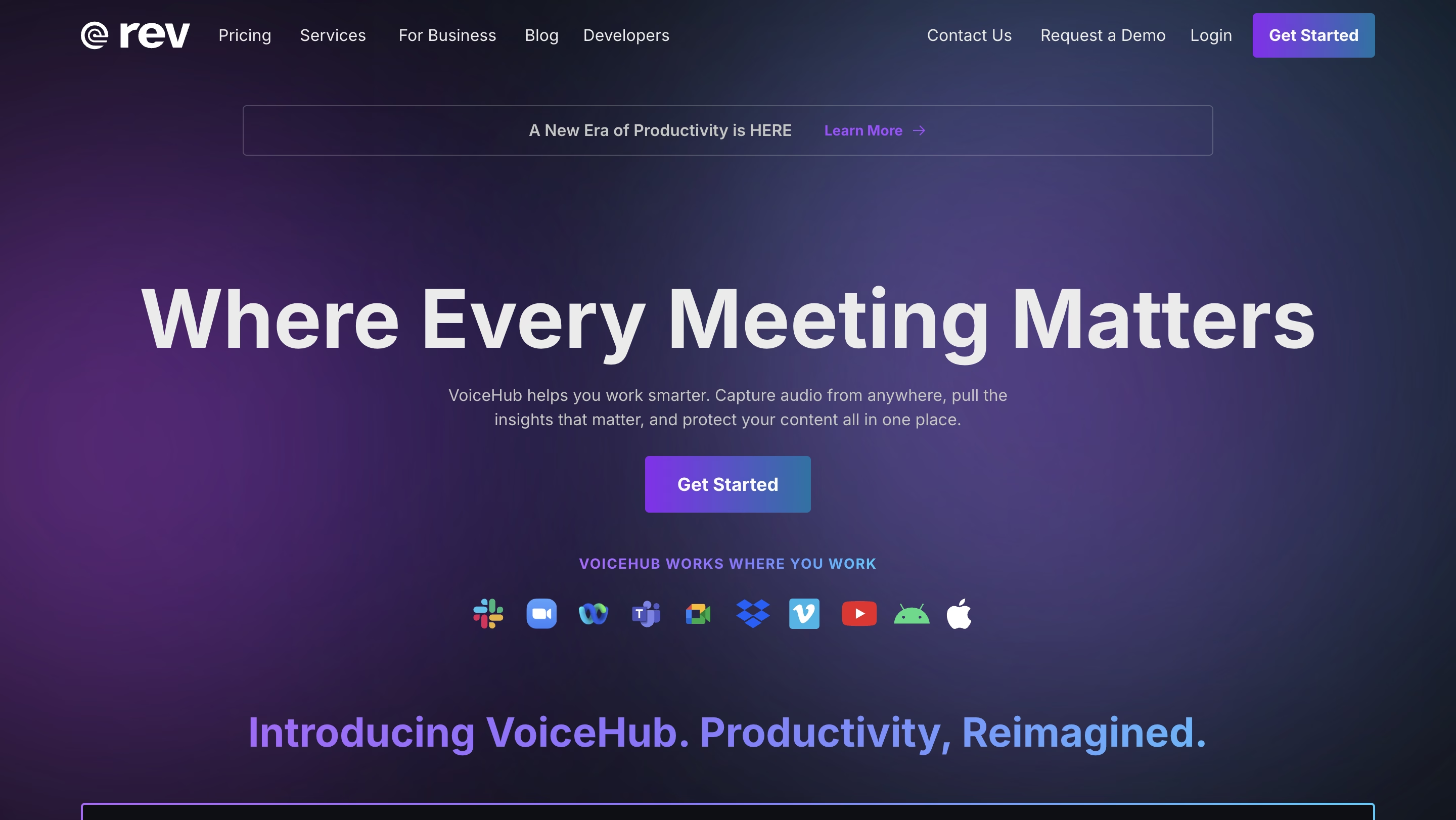
Another tool for transcribing audio to text for lectures is Rev.com, which offers accurate transcriptions in most scenarios. It can even translate these transcriptions into over 38 languages and record notes, lectures, and interviews.
While the tool comes with a free plan, it only covers 45 minutes of AI transcriptions per month, which is vastly inadequate for students who must transcribe several hours of lectures in a single day without utilizing automatic transcription software . In comparison, the paid plans make it rather difficult for students to pay for a monthly subscription, especially if they need more transcription time.
Otter.ai
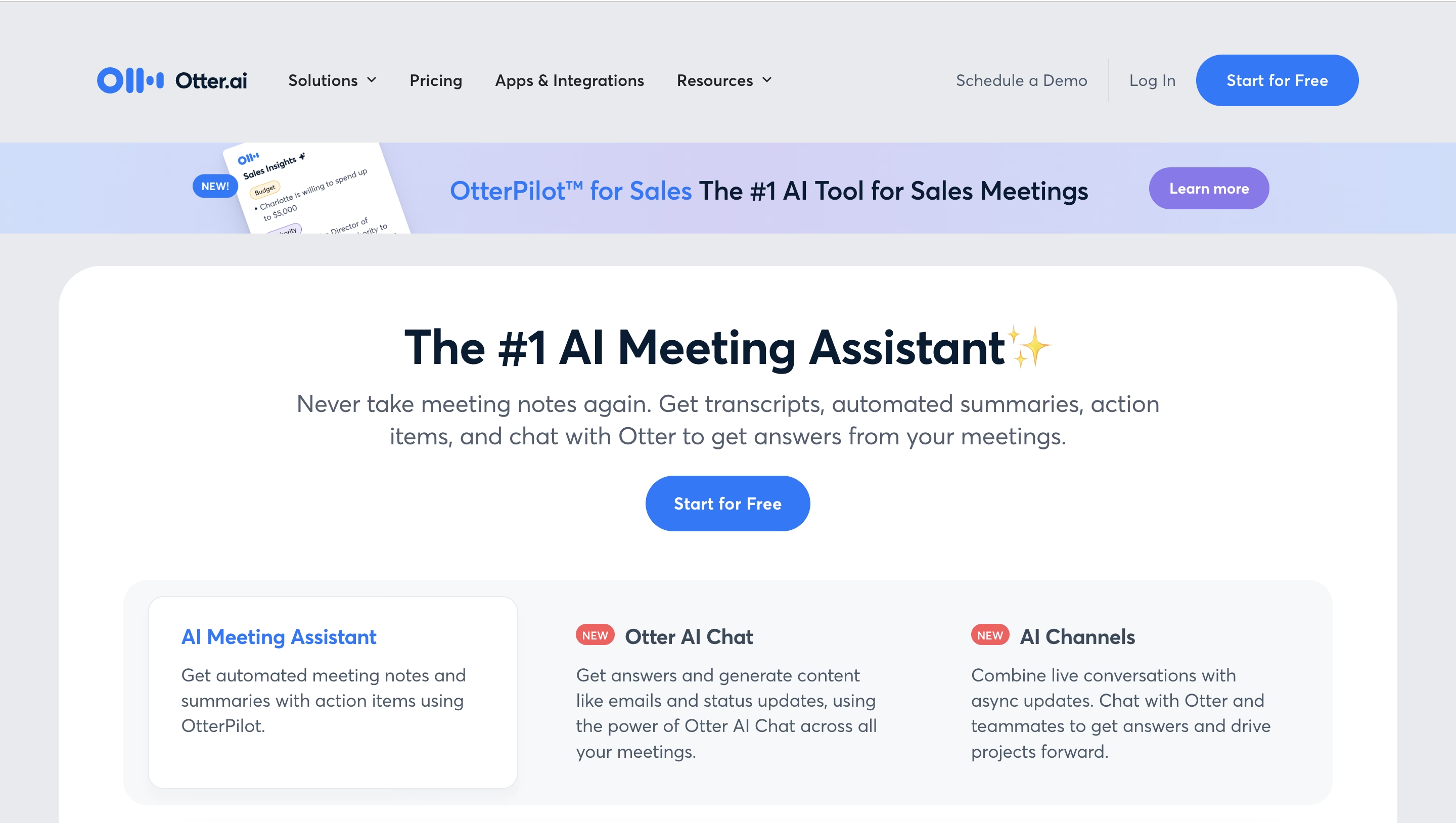
The third tool is Otter.ai, an AI-powered transcription service that transcribes lectures in real-time and allows users to share these transcriptions with peers. It also functions as a meeting assistant, summarizing discussions and generating actionable items.
However, Otter.ai may not always provide the level of accuracy required by students, particularly when transcribing complex academic jargon. This lack of precision can lead to unreliable transcripts, necessitating additional time for manual edits to ensure the information is correct.
Conclusion
The best way to transcribe lectures is to use technology rather than manual note-taking. This is one of the key benefits of the increased use of technology in the classroom. AI tools and technology have helped educators improve the quality of their teaching methodologies, save time, and create a more equitable classroom environment.
An audio-to-text tool like Transkriptor offers 99% accurate transcripts most of the time and can translate them into 100+ languages, which makes it ideal for use in educational institutions. T ry it for free today to experience how it can transform teaching and learning experience.


